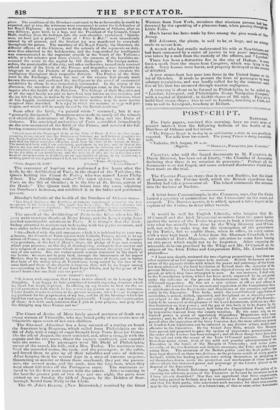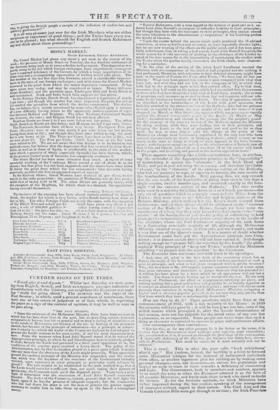It would be we'll for English Liberals, who imagine that
Mr. O'Connell and the Irish Nlinisterial members form the grand barrier against the return of the 'Furies to power, to look a little more closely into what has actually been done by flu: Whig Ministry and O'Con. nell, not only to make way for the resumption of the government by the Tories, but to enable them, when in office, to carry matters with a very high hand. A letter from Mr. Sharman Crawford, in the last number of Tait's Magazine, culls attention to some facts bearing 011 this point which ought not to be forgotten. After exposing the miserable delusion practised by the Whigs and Mr. O'Connell on the subject of the Irish Tithes and Corporation Bills, Mr. Crawford thus proceeds-
" I have now shortly reviewed the two claptrap propositions ; but there are
other matters of no less importance to be noticed. British Reformere are not aware of the gigantic strides with which the power and patronage of the Crown has been advanced in the local lelislation of Iceland since the accession of the ' present Ministry. This has been the main object of every act which they have passed, or which they have attempted to pass. As one instance, I shall refer to the Constabulary system, which has been newly organized by an act passed under the infl'ue'nce of the present Administration, with the aid of their O'Connell supporteis. By this act a new retinue of offices and officers ii created. All control over the amount and regulation of the Constabulary force is withdrawn firm the fiscal bodies and Magistracy of the counties, and vested solely in the Executive. This body, under the constitutional appellation of constables, is armed, drilled, appointed, anti disciplined as a standing army— not sulgect to the Mutiny Act—not subject to the control of Parliament— liable to be increased at the pleasure of the Lord-Lieutenant, without ary tive limitation on that power ; and the pay of this body is to be drawn by the warrant of the Lord-Lieutenant, half from the Consolidated Fund, ;led hif by imperative warrant from the county taxation. By the same act, an efl. limited power is given of appoiuting Stipendiary Magistrates wita large salaries • and, by the Coercion Act of the Melbourne Government, which was passed after the expiration of the Grey Coercion Act, the most arbitrary riven of Curfew-Law legislation can be enforced in any district which makes itself offensive to the Executive. By the Grand Jury Bills, which this Maier, have passed and pioposied to pass, the system of imperative presentments (by the order of the Crown) has been enlarged • and all these things have been done by the aid and with the assent of the Irii:11 O'Connell patriots. T hey hoe been done under cover, first, of the mild and popular administration of the Executive in the hands of the Marquis of Normariby ; and under cove, secondly, of Ow two fictitious and delusive measures, the Tithe and theCorpo- ration Bills, The attention of the British public (and the Irish public) has been kept directei on these two fictions, as the primune mobile of every good to Ireland ; whilst her leading patriots were setting themselves, or preparing to set themselves down, under the protection ahd emolument of those lucrative offiees which this increased power and patronage of the Crown placed at the disposal of the Executive. " Again, do British Reformers apprehend no danger from the policy of ire creasing the arbitrary powers of the Executive in Ireland by measures such es I have already deser Died? May they not apprehend that those experiments, after being proved in Ireland, may be transferred to England and Scotland?-- and that the Irish party, who sanctioned such measures for their own country, may be the ready assistants, at a future time, of this or some other Admiaistra•
tiaa, in giving the British: people a sample of the infliction of curfew-law and vbitrary government?"
It is an very pleasant just now for the Irish Members who are either recipients or expeetants of good things; and the Tories have every rea- son to be pleased; but what should the English and Scotch Reformers say and think about these proceedings?



























 Previous page
Previous page